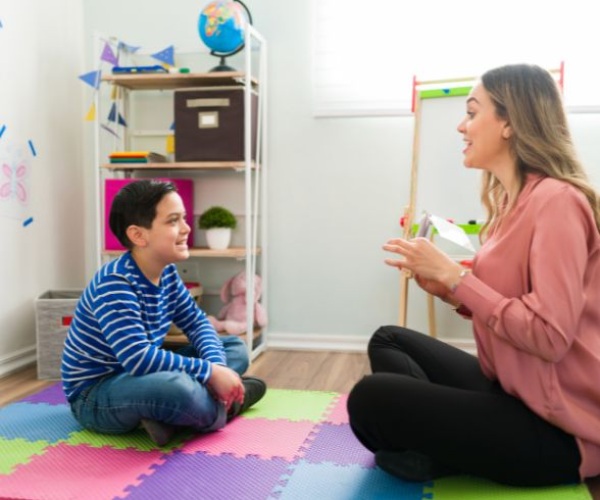How can a speech pathologist help my child?

In Australia, it’s very common to have difficulties with communicating. Communication problems may result from a range of conditions that may affect children including stroke, brain injury, cleft palate, learning and intellectual disabilities, developmental delay, autism spectrum disorder, cerebral palsy, hearing loss, stuttering, progressive neurological disorders (e.g. muscular dystrophy), cancer, spinal injury.
It has been estimated that one in five four-year-old children struggles with understanding or using language. A speech pathologist is a health professional who works with anyone who has trouble communicating or swallowing. They are trained over a period of four years in the diagnosis, management and treatment of those who are unable to communicate effectively or who have difficulty with feeding and swallowing.
Communication difficulties may include trouble with:
- Speech — saying the sounds in words
- Language — speaking and understanding others
- Communication – use of body language and social skills
- Voice — using the vocal cords to produce speech
- Fluency — stuttering and cluttering
- Literacy — reading and writing
Therefore your child might see a speech pathologist if they have;
- problems being understood by other people
- problems understanding what people say
- frustration because they can’t say what they want to say or can’t be understood by others
- a husky voice that’s hard to hear
- stuttering
- difficulties with spelling, reading or writing.
- social communication difficulties such as making friends
A speech pathologist may assess your child’s strengths and difficulties to work out the best way to develop your child’s ability to communicate. This might include strategies to improve how clearly or fluently they speak. It might also include forms of assisted communication, like signs, symbols and gestures.
Speech pathologists also help children who have trouble feeding, as well as children and adults who have difficulties with swallowing food and drink. These difficulties may include:
- Needing help with feeding
- Having problems swallowing
- Having an intellectual disability, genetic condition or severe speech difficulties and need help finding alternative ways to communicate
- Having a history of ear infections and you’re worried about their communication.
The benefits of speech pathology for children can be great when dealing with complex disabilities and their associated communication or swallowing difficulties. For example, a child with cerebral palsy may have difficulty controlling the muscles in their face, throat, neck and head, which can lead to troubles with speech, chewing and swallowing. While speech therapy is different for every child with cerebral palsy, therapy will aim to help improve a child’s speech and communication by strengthening the muscles used for speech, increasing oral motor skills and improving their understanding of speech and language. It also can help with swallowing disorders like dysphagia.
A child with a developmental disorder such as autism or Down Syndrome who needs help with their receptive language can also be supported by a speech pathologist. Symptoms of receptive language disorder include not seeming to listen when they are spoken to, appearing to lack interest when storybooks are read to them, and difficulty understanding the meaning of words and sentences.
For babies, toddlers and preschool/school-aged children, a visit to the speech pathologist is recommended in the following circumstances:
- They get frustrated trying to communicate
- They have difficulty understanding what is said to them, or following instructions
- Their speech is hesitant or lacks fluency
- They’re non-verbal and don’t have functional communication
- They have difficulties with reading
- They struggle to use language in social interactions and understanding social rules
- They have a limited diet, or difficulty chewing and swallowing food and fluids
It can be difficult as a parent to decide whether or not your child needs the services of a speech pathologist. But if your child sounds different to other children of the same age, your three-year-old can’t be understood by adults, or if your child has a history of ear infections, you may wish to consider making an appointment to see a speech pathologist.
Contact us at Prosper Health Collective to find out more about how we can help your child to flourish and thrive with their speech and language.